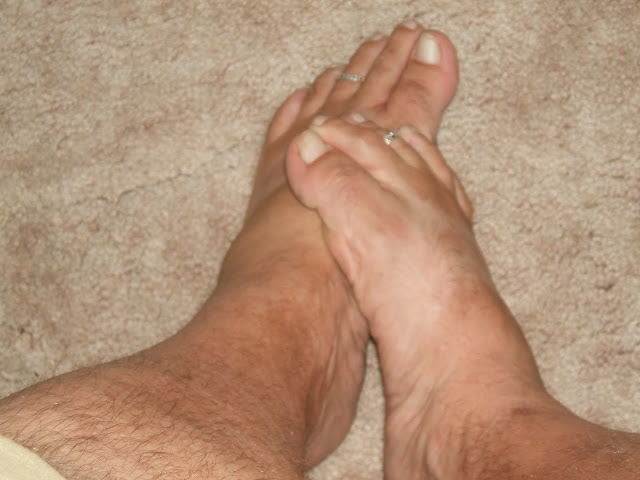
In addition to being pleasurable, going barefoot is healthy and many barefooters go barefoot for the beneficial effects also. In fact, some barefooters feel safer when barefoot than when wearing shoes.
Barefoot is what Nature Intended
Going barefoot is natural. Yet some non-barefooters actually think it's unnatural and that humans, alone among all the other species on the planet, have feet that are somehow uniquely inadequate and fragile. This, however, makes no sense if one merely takes the time to think it through. Dr. Steele F. Stewart, noted:
** Millions of Indians, both American and Asian, and Congoids wander their native savannas and rain forests without protection, inconvenience, or complaint. Footgear, therefore, would appear to be unnecessary.
We should learn from primitives the pleasure and painlessness of going barefoot.
Additionally, Robbins, et al, stated:
** The opinion that the lower extremities are inherently fragile goes against the authors' understanding of the concept of natural selection.
And Samuel B. Shulman, stated:
** People who have never worn shoes acquire very few foot defects, most of which are painless and non-debilitating. The range of their foot motions are remarkably great, allowing for full foot activity. Shoes are not necessary for healthy feet and are the cause of most foot troubles. ... Footgear is the greatest enemy of the human foot.
For those barefooters who are religious, they believe their Creator was not only competent in the design of the human foot, but it was intended to be an organ of touch and that joy should be graciously accepted from the world at our feet.
Barefoot is what Nature Intended
Going barefoot is natural. Yet some non-barefooters actually think it's unnatural and that humans, alone among all the other species on the planet, have feet that are somehow uniquely inadequate and fragile. This, however, makes no sense if one merely takes the time to think it through. Dr. Steele F. Stewart, noted:
** Millions of Indians, both American and Asian, and Congoids wander their native savannas and rain forests without protection, inconvenience, or complaint. Footgear, therefore, would appear to be unnecessary.
We should learn from primitives the pleasure and painlessness of going barefoot.
Additionally, Robbins, et al, stated:
** The opinion that the lower extremities are inherently fragile goes against the authors' understanding of the concept of natural selection.
And Samuel B. Shulman, stated:
** People who have never worn shoes acquire very few foot defects, most of which are painless and non-debilitating. The range of their foot motions are remarkably great, allowing for full foot activity. Shoes are not necessary for healthy feet and are the cause of most foot troubles. ... Footgear is the greatest enemy of the human foot.
For those barefooters who are religious, they believe their Creator was not only competent in the design of the human foot, but it was intended to be an organ of touch and that joy should be graciously accepted from the world at our feet.
Going Barefoot Promotes Healthy Feet
Many non-barefooters think you can catch athlete's foot or other diseases, or develop debilitating foot conditions, by going barefoot. Regarding athlete's foot, the American Academy of Dermatology, stated:
** Athlete's foot does not occur among people who traditionally go barefoot. It's moisture, sweating and lack of proper ventilation of the feet that present the perfect setting for the fungus of athlete's foot to grow.
Regarding other conditions, Stewart, stated:
** All writers who have reported their observations of barefooted people agree that the untrammeled feet of natural men are free from the disabilities commonly noted among shod people--hallux vagus, bunions, hammer toes, and painful feet.
And Robbins, et al, stated:
** The reports that the authors have received indicate a low frequency of plantar fasciitis in barefoot populations.
Finally, bare feet do not naturally stink. There is no difference between the sweat glands of the feet and those of the hands. Feet stink only after they have been sweating in shoes for many hours. We believe that many non-barefooters assume that all feet stink because theirs do.
 |
| What shoes make my feet feel like |
Bare Feet are not Fragile
Robbins, et al, explains:
** Compared with the hairy skin of the thigh, plantar skin required approximately 600% greater abrading loads to reach pain threshold. ... We conclude that plantar skin is well protected through sensory feedback from abrasive injuries when barefoot. This information combined with previous reports suggests that risk of injury when normally shod individuals perform barefoot locomotion should be low.
The results of studies examining barefoot activity have consistently shown that the unshod human foot is characterized by excellent mobility, primarily in the region of the forefoot, thickening of the plantar skin up to 1 cm, better alignment of the phalanges with the metatarsals causing the digits to spread, an absence of foot deformities, and mobility of the arches on loading.
Observations from countries where barefoot activity is the norm indicates that plantar skin eventually becomes robust and permits extremely long duration of barefoot locomotion at high average velocities, without signs of damage to plantar skin, or for that matter other lower extremity injuries.
In conclusion, this experiment continues to enlarge the body of knowledge suggesting how well the human foot is adapted for safe locomotion, unencumbered by footwear...
Even though plantar skin thickens as a result of going barefoot, the soles of barefooters' feet do not become thick, hard, dead layers of skin; rather, the soles become a supple layer of "living leather" still very much alive and able to feel. As a side note, some barefooters take pride in having thick "leather pads." ...
--need more proof? barefooters.org





No comments:
Post a Comment